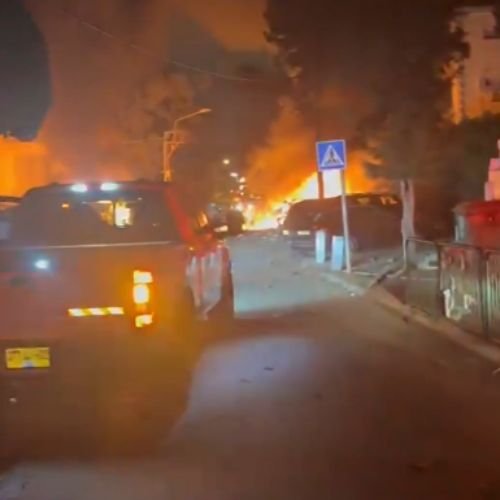Tensions between Iran and Israel surged on Sunday as Iran launched another massive missile barrage, prompting sirens to blare across cities including Jerusalem and Tel Aviv.
The Israeli army confirmed incoming missiles and videos from the region showed interceptors in action, successfully neutralizing several threats in the sky.
Israel Launches Retaliatory Strikes on Iranian Territory
In response to the Iranian assault, Israel initiated a fresh round of retaliatory air strikes, targeting Iranian positions and infrastructure.
According to reports from local media, air defence systems were activated in Israel’s southwestern region as military operations intensified. This latest exchange marks a deadly escalation in the long-standing rivalry between the two nations.
Scores of civilians have reportedly died since the conflict intensified. In Haifa, a large fire broke out following Iranian missile strikes, with four people confirmed injured so far, according to unnamed Israeli officials cited by RT International.
❗️Firefighters struggle to contain INFERNO after Iranian missile strike in Haifa
Four people injured in barrage so far, Israeli authorities say https://t.co/WBuoFUFcj3 pic.twitter.com/zMtkzgfdRL
— RT (@RT_com) June 15, 2025
Daylight Missile Sirens Ring Across Israel
For the first time in this round of hostilities, missile sirens were triggered during daylight hours, starting at 4 PM local time on Sunday. The attacks have gripped the country in anxiety as both military and civilian areas continue to come under fire.
Iran too faced the brunt of Israel’s retaliatory operations. In Tehran, the night sky was lit up by flames after Israeli airstrikes hit a major fuel depot. These attacks reportedly targeted the country’s vital oil and gas sector, significantly raising global economic concerns.
Israel Hits Aircraft in Long-Range Strike Inside Iran
In a dramatic development, the Israel Defense Forces (IDF) claimed responsibility for striking an Iranian aircraft at Mashhad Airport in eastern Iran—approximately 2,300 km from Israeli territory. This marks the IDF’s longest-range attack since the launch of “Operation Rising Lion.”
Israel maintains that its goal is not regime change in Iran but the dismantling of its nuclear facilities and missile infrastructure. Operation Rising Lion began with a surprise Israeli offensive on Friday that eliminated key Iranian military leaders and damaged several nuclear assets.
Over 200 ballistic missiles have been launched by Iran over the past two nights, some of which penetrated Israel’s advanced anti-missile systems.
One such strike hit residential buildings in Bat Yam, killing six civilians. Prime Minister Netanyahu, addressing the public from a damaged residential area, vowed Iran would face severe consequences for targeting innocent lives.
Iran Warns of Harsher Retaliation Amid Rising Tensions
Iranian President Masoud Pezeshkian responded strongly, promising increasingly decisive retaliation if Israeli airstrikes continue. With both sides unwilling to de-escalate, global leaders fear this may spiral into a wider regional war.
The conflict’s impact on global energy markets is already being felt. Oil prices soared 9% on Friday even before Israel’s airstrikes hit key targets like Tehran’s Shahran oil depot and the South Fars gas field—one of the world’s largest producers of domestic gas. Experts anticipate more market volatility as trading resumes.
Iran Moves to Contain Fuel Fires, Urges Civilians to Take Shelter
Iranian authorities claimed the fire at the Shahran depot was under control and urged citizens to seek refuge in safe zones such as mosques, schools, and subway stations.
As both nations exchange heavy fire, humanitarian concerns and economic instability continue to mount.
ALSO READ: Israeli PM Netanyahu In New Explosive Interview Says Iran Wants To Kill Donald Trump



